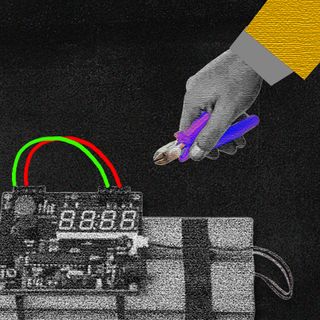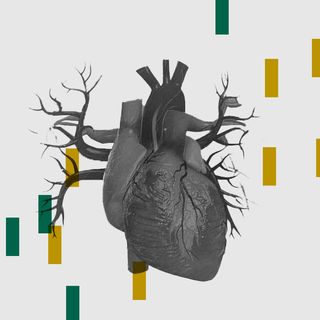
How Comforting a Friend Can Help Reduce Our Own Distress
“Instead of being a passive observer, actively helping to reduce another person’s suffering has the added benefit of reducing your own.”

There might be unexpected benefits to helping a friend in emotional turmoil, according to a new study. Researchers from Germany recently found out that when we actively help someone reduce the negative feelings they may be stewing in, we end up easing our own distress. In other words, assisting someone with regulating their emotions, helps us regulate our own too.
Published in the journal NeuroImage, the study looked at functional magnetic resonance imaging (fMRI) scans of participants to trace how this plays out in the brain. The researchers concluded that rather than passively observing someone make their way through an emotional roller-coaster, engaging ourselves in comforting them can ensure our own emotional wellbeing — at least, momentarily. In fact, the impact of placating another was akin to practicing self-regulation of emotions through different coping strategies — like validation, reappraisal, mindful acceptance, or evaluating thinking errors.
Evidently, this is not the first study to have arrived at this conclusion. A 2017 study, published in the Personality and Social Psychology Bulletin, had noted: “Helping [others] regulate their emotional reactions to stressful situations may be a particularly powerful way to practice and hone our own regulation skills, which can then be applied to improve our own emotional wellbeing.”
Providing deeper insight into its findings, Kira Newman the managing editor of Greater Good, UC Berkeley, had explained, “[H]elping other people regulate their emotions… seemed to be training people in the very skills of emotion regulation. It didn’t seem to matter if participants helped each other with validation, reappraisal, or pointing out errors; the interaction itself was most important.” In other words, no matter the technique of comforting one chose to employ, it ended up positively impacting their own emotional state.
What the new study offers, though, is an answer as to why comforting someone benefits oneself too. The researchers found that regulating emotions — be it for one’s own or that of others they’re trying to comfort — may involve shared neural circuits in one’s brain. As a result, helping another individual regulate negative emotions enables one to reduce their own distress.
Related on The Swaddle:
Is This Normal? “I Tear Up Every Time I Try to Pacify Someone Who’s Crying”
Interestingly, though, the present study also found that it’s empathetic people who are impacted the most by the emotional distress of those around them — and also the ones who struggle the most with regulating their emotions. A past study, published in the Journal of Behavior Therapy and Experimental Psychiatry, had found that when we help others regulate their emotions, they fare better at it than if they were to go through it alone. When read in consonance, these two studies appear to indicate that the act of comforting others can be a win-win situation for both parties involved.
As Newman notes, “all this suggests that getting out of our heads and into the heads of others — empathy, in other words — is good for everyone involved. And when we feel alone in our suffering, we can turn to others both for our own sake and for theirs.”
These findings, however, do more than just offer insights into human behavior — and the neurobiology it’s rooted in. They could, potentially, have practical applications too.
Related on The Swaddle:
Why Stress Makes the Most Empathetic People Less Kind
Arash Emamzadeh, who studied genetics and psychology at the University of British Columbia in Canada, wrote in Psychology Today of one such potential application. “When exposed to their romantic partner’s intense feelings (fear, anxiety, anger), individuals [with borderline personality disorder (BPD) who struggle with poor emotional regulation] tend to experience extreme distress and behave in maladaptive ways — e.g., expressing hostility or trying to distance themselves from their spouse or boyfriend/girlfriend… The findings reviewed suggest teaching people with BPD to focus on reducing their partner’s stress may actually reduce their own stress (or at least not increase it).”
Emotional dysregulation can manifest as angry outbursts, suicidal thoughts or self-harm, substance abuse, conflicts in interpersonal relationships, and even severe depression and anxiety. Besides people with BPD, it is also observed in individuals living with major depressive disorder (MDD), as well as disruptive mood dysregulation disorder (DMDD). Many autistic and ADHD individuals, too, deal with the same — with emotional dysregulation even being a core trait of the latter more often than not. Childhood trauma and neglect, too, can make it challenging for people to regulate their emotions effectively.
However, it may a long while until the findings can be used to devise an effective treatment strategy for emotional dysregulation. Until then, perhaps, there’s solace in knowing that expending one’s energy into calming another down, does justify the drain on one’s emotional resources; and as it turns out, the process is rewarding too.
Devrupa Rakshit is an Associate Editor at The Swaddle. She is a lawyer by education, a poet by accident, a painter by shaukh, and autistic by birth. You can find her on Instagram @devruparakshit.
Related


How the Human Heart Can Repair Itself After a Heart Attack, According to a New Study
